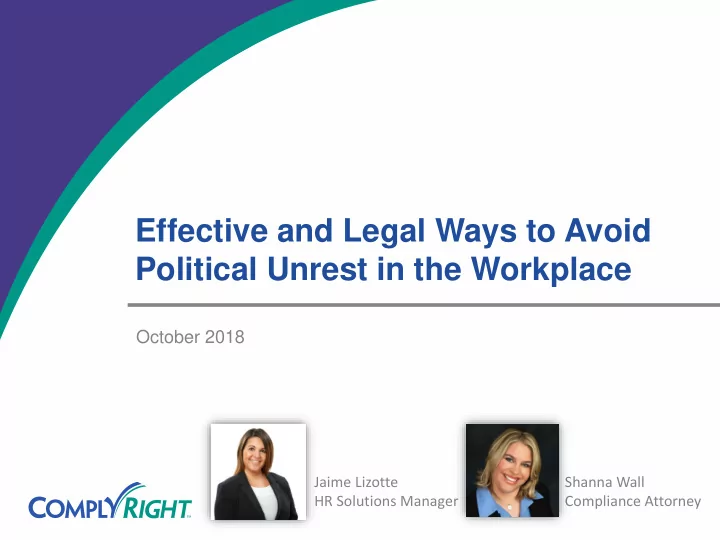

Effective and Legal Ways to Avoid Political Unrest in the Workplace October 2018 Jaime Lizotte Shanna Wall HR Solutions Manager Compliance Attorney
Welcome Before we get started… Use the chat box on the left to ask questions Audio for today's webinar will come through your computer speakers. Please be sure your speakers are turned on and you have the volume turned up If you are signed on more than once, please locate the duplicate log-in and close it. This will create a better audio experience All attendees will receive a link to the presentation and slides in a follow up email
What We’ll Cover Why you should be concerned with political discussions in the workplace What your legal obligations… and rights as an employer What you can do to prevent political discussions from getting out of control What steps you should take to keep the peace and restore productivity in your workplace
Are these Statements Familiar? “Every American can own guns. It’s our Second Amendment right.” “Protesting during the national anthem is a slap in the face to our veterans.” “It’s un - American to wear Nike.” “Trump supporters are white and uneducated.” “You can’t even compliment a woman today without her accusing you of harassment.” “Illegal immigrants are dangerous criminals.”
Stats about Workplace Political Discussions A 2017 survey on politics in the workplace found that: 54% of employees have engaged in political discussions at work after the presidential election 26% reported feeling stress due to these discussions 21% said workplace political discussions have made them feel cynical and negative 40% reported exchanging political views has led to at least one negative outcome, such as difficulty getting work done 15% admitted they have gotten into an argument with coworkers over politics
What You Should Understand… You will never eliminate all political discussion from the workplace Allowing it to go unchecked can affect productivity And it can lead to legal issues, including lawsuits
Scenario #1 Harassment: Coworkers are engaged in a casual political discussion regarding immigration New employee walks by and overhears the conversation that shifted into an offensive discussion regarding his national origin Title VII of the Civil Rights Act of 1964 prohibits harassment based on national origin
Scenario #2 Discrimination: Manager calls a female employee a “trouble maker” because she has made anti-Republican statements and is active in protests Female employee is passed over for a promotion based on the assertion that certain clients may not like her Title VII of the Civil Rights Act of 1964 prohibits discrimination based on sex State or local laws may also prohibit discrimination based on political affiliations or activities
What Are Your Rights? Generally private employers have the right to: Limit or prohibit political discussions or activities during working hours Prohibit solicitations for contributions or support for a political campaign during working hours Prohibit the company’s name or affiliation in connection with any political or campaign activity
What Are Your Responsibilities? You have an obligation to: Keep your work environment safe and free from hostility Keep political discussions from escalating into heated debates Take action to prevent conversations from turning into harassment or discrimination
What about Free Speech? Employees have a right to freedom of speech but that protection is limited in the workplace Private employers are not required to let free speech ring throughout the workplace Managers have the right to discipline at-will employees who disrupt the workplace
Put Policies in Place First, you need to have formal policies that are clearly communicated and acknowledged by all employees: Develop an anti-harassment policy that explains that harassment or discrimination on the basis of any protected characteristic will not be tolerated Create a formal policy on political expression that details your company's views on political discussions and activities
Politics in the Workplace Policy Your policy should : Discourage political conversations when employees are on the clock Forbid political conversations with customers Disallow displaying or wearing materials related to a candidate Prohibit persuading coworkers to vote for a candidate
Politics in the Workplace Policy (Cont’d) Explain that employees should walk away or change the subject if a conversation gets uncomfortable Reinforce your “open door” policy for employees to discuss any concerns with managers State that violators of the policy are subject to discipline, up to an including termination Take into account any state or local laws
How to Handle Workplace Political Discussions Discipline disruptions, but don’t punish perspectives Allow employees to discuss political views off the clock as long as the conversation remains civil Step in and end workplace arguments before they become bigger problems Communicate your company’s policy on political expression
Handling Workplace Political Discussions (Cont’d) Implement an open-door approach, encouraging employees to raise concerns as soon as possible Be careful when engaging subordinates in political debates Adopt and enforce an anti-harassment policy that explains that harassment on the basis of any protected characteristic will not be tolerated Be consistent when disciplining employees
Don’ts of Workplace Political Discussions Do not: Allow employees to use work time or company resources for political goals Permit employees to distribute any political literature or materials at work Let employees make political statements to customers Neglect to train supervisors on what to do if they observe inappropriate conduct
Employee Communications Remind employees to: Excuse themselves from any unwanted political discussions Be sensitive to the time and energy they’re spending discussing politics on the job Leave strong opinions to themselves Change the topic if necessary
Employee Communications (Cont’d) Remind employees to: Speak up if something makes them uncomfortable Agree to disagree Know and understand the audience Be open- minded to others’ differences Review company policy if unsure
HR Solutions Includes: 11” x 17” laminated poster Pack of 25 Political Activities Employee Policies Written by Employment Attorneys Includes ComplyRight Tips for optimal, compliant use For more info visit www.hrdirect.com
Questions Reminder: All attendees will receive a link to the presentation and slides in a follow up email.
Recommend
More recommend